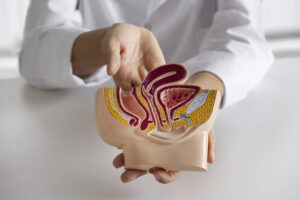Ventral Hernia Treatment in Indore

Expert Surgical Care by Dr. Pranav Mandovra – Leading Hernia Specialist
A ventral hernia occurs when tissue pushes through a weak spot in the abdominal wall, typically in the midline of the abdomen. It may develop spontaneously or at the site of a previous surgery, especially in cases of poor wound healing or strain on the abdominal muscles.

Symptoms of Ventral Hernia
- Noticeable bulge in the abdomen
- Pain or discomfort, especially when coughing or lifting
- Feeling of pressure or weakness in the abdominal wall
- Swelling that may reduce when lying down
Why Treatment is Important
While some inguinal hernias may not cause pain initially, they do not heal on their own. Without treatment, they can enlarge and may lead to serious complications like strangulation, where blood supply to the herniated tissue is cut off.
- Specialist in Laparoscopic and Open Hernia Repairs
- Minimally Invasive Techniques with faster recovery
- Customized Treatment Plans based on your condition
- Proven Outcomes and patient satisfaction
Why Choose Dr. Pranav Mandovra in Indore?
- Specialist in Hernia & Abdominal Wall Reconstruction
- Expertise in Laparoscopic & Open Ventral Hernia Repair
- Personalized Surgical Planning for Optimal Results
- Focus on Fast Recovery & Minimal Recurrence
Treatment Options
Laparoscopic Ventral Hernia Repair
- Minimally invasive
- Short hospital stay
- Faster recovery time
Open Mesh Repair
- Ideal for large or complex hernias
- Strong reinforcement of the abdominal wall
Contact Us
Get long-term relief from abdominal discomfort with expert hernia care. Book your appointment today with Dr. Pranav Mandovra.
Contact Dr. Pranav Mandovra today to schedule a consultation and take the first step towards hernia treatment in Indore!.
Call to book Appointment: 87702 30725
Address: OPD No -510 , 5th Floor, Medicare Hospital & Research Centre, 4/5, Ravindra Nagar, Old Palasia, Indore, Madhya Pradesh 452001
Ventral Hernia Treatment in Indore

Expert Surgical Care by Dr. Pranav Mandovra – Leading Hernia Specialist
A ventral hernia occurs when tissue pushes through a weak spot in the abdominal wall, typically in the midline of the abdomen. It may develop spontaneously or at the site of a previous surgery, especially in cases of poor wound healing or strain on the abdominal muscles.

Symptoms of Ventral Hernia
- Noticeable bulge in the abdomen
- Pain or discomfort, especially when coughing or lifting
- Feeling of pressure or weakness in the abdominal wall
- Swelling that may reduce when lying down
Why Treatment is Important
While some inguinal hernias may not cause pain initially, they do not heal on their own. Without treatment, they can enlarge and may lead to serious complications like strangulation, where blood supply to the herniated tissue is cut off.
- Specialist in Laparoscopic and Open Hernia Repairs
- Minimally Invasive Techniques with faster recovery
- Customized Treatment Plans based on your condition
- Proven Outcomes and patient satisfaction
Why Choose Dr. Pranav Mandovra in Indore?
- Specialist in Hernia & Abdominal Wall Reconstruction
- Expertise in Laparoscopic & Open Ventral Hernia Repair
- Personalized Surgical Planning for Optimal Results
- Focus on Fast Recovery & Minimal Recurrence
Treatment Options
Laparoscopic Ventral Hernia Repair
- Minimally invasive
- Short hospital stay
- Faster recovery time
Open Mesh Repair
- Ideal for large or complex hernias
- Strong reinforcement of the abdominal wall
Contact Us
Get long-term relief from abdominal discomfort with expert hernia care. Book your appointment today with Dr. Pranav Mandovra.
Contact Dr. Pranav Mandovra today to schedule a consultation and take the first step towards hernia treatment in Indore!.
Call to book Appointment: 87702 30725
Address: OPD No -510 , 5th Floor, Medicare Hospital & Research Centre, 4/5, Ravindra Nagar, Old Palasia, Indore, Madhya Pradesh 452001
